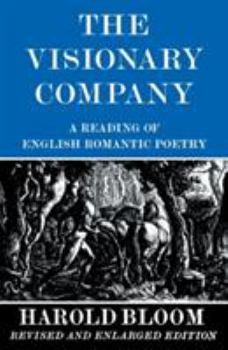The Visionary Company: A Reading of English Romantic Poetry
Select Format
Select Condition 
Book Overview
This is a revised and enlarged edition of the most extensive and detailed critical reading of English Romantic poetry ever attempted in a single volume. It is both a valuable introduction to the Romantics and an influential work of literary criticism. The perceptive interpretations of the major poems of Blake, Wordsworth, Coleridge, Byron, Shelley, Keats, Beddoes, Clare, and Darley develop the themes of Romantic myth-making and the dialectical...
Format:Paperback
Language:English
ISBN:0801491177
ISBN13:9780801491177
Release Date:May 1971
Publisher:Cornell University Press
Length:506 Pages
Weight:1.32 lbs.
Dimensions:1.2" x 5.4" x 8.4"
Age Range:18 years and up
Grade Range:Postsecondary and higher
Customer Reviews
5 ratings
A Must Read for Students of Romanticism
Published by Thriftbooks.com User , 18 years ago
As a graduate student writing her thesis on these amazing gentlemen, I fully and wholehartedly recommend this text as a primer. But be sure to have the poetry collections on hand because this is not an anthology, and Bloom assumes a certain level of familiarity with the works of Blake, Coleridge, Wordsworth, Shelley, Byron, and Keats.
Romantic Theory
Published by Thriftbooks.com User , 21 years ago
things about Romantic Theory,what is romantic theory,who wrote romantic theory
bloom on the romantics . . .
Published by Thriftbooks.com User , 21 years ago
Bloom ate Blake, Crane, Shakespeare, Shelley, and the rest of them before adolescence and has been digesting ever since. Even before his lifelong meal, his intellect is simply larger and sharper than anyone else's.
Explaining the inexplicable
Published by Thriftbooks.com User , 23 years ago
A couple of things to start off: This is the best of Bloom at the height of his power, and this book is ultimatly the one that will be remembered despite Bloom's sad, downward spiral into "Omens of The Millenium" and other such kitsch.-This book, when first published in 1960, was an affront to the prevailing Neo-Classicism triumphed by T.S. Eliot and the soi-disant New Criticism, both of which defined themselves, to a great extent, by despising the Romantics and in seeking to give the lie to their poetic ability and influence. Neither school is now given much account, while the Romantics are still with us.-The problem with a book defending the Romantics and explaining their poetry is that you are attempting to explain what the poets themselves saw as inexplicable, the vision of the visionary company is that of a divine beauty not of this world making itself known to the poets not at the summoning of their will, but, as Shelley beautifully puts it, like a sudden wind firing a fading coal. It would be a futile endeavor to go over the texts of each of the poets in this necessarily brief review and explain, as Bloom does, how this vision manifested itself in each of them.-That's, after all, what the book's for!-But, as an example, take the final poem of one of Bloom's and my favorite of the Visionary Commpany, Shelley. His unfinished, final poem before he drowned at the age of 30, "The Triumph of Life," is an almost perfect example of why defending the Romantics is such a difficult and complex task, and why this book is such a triumph for Bloom. The "Triumph of Life" describes a public way thronged with people "All hastening onward, yet none seemed to know whither he went, or whence he came, or why...". This is the plight not only of the common man, but of kings, potentates etc. (Napolean makes a brief and horrid appearance). Then follows behind a blazing chariot, which is Life here on Earth as we commonly know it, and that light blinds all to the moon and stars, symbols of Nature and Imagination, respectively. Thus Shelley learns, in common with all the Romantics who had not the luck that Keats had, of dying young, that the "spark with which heaven lit my spirit" is no match eventually for the blinding light of Life. This view of common life, devoid of poetic vision, as, frankly, something evil, is a difficult matter to explain to those who have not shared in the vision. But, intellectually, it's subject matter should not appear strange. It amounts to the Fall of Man, as described Biblically.-The upshot of all this for the poet, who now sees life as evil, is that, quoting Bloom, "Life, our life, can be met only by quietism or by willful self-destruction." This echoes some lines by that later (some would say last) Romantic, Yeats, "What portion can the artist have, who has awakened from the common dream, but dissipation and despair?"-This is hard and unpleasant to many, but it is logical, and makes sense of what the aforementioned literary
Superb Introduction to British Romanticism
Published by Thriftbooks.com User , 24 years ago
The most accessible book on British Romanticism I've ever read. Bloom does an outstanding job providing the big picture of the period and a close, specific explication of individual works.






